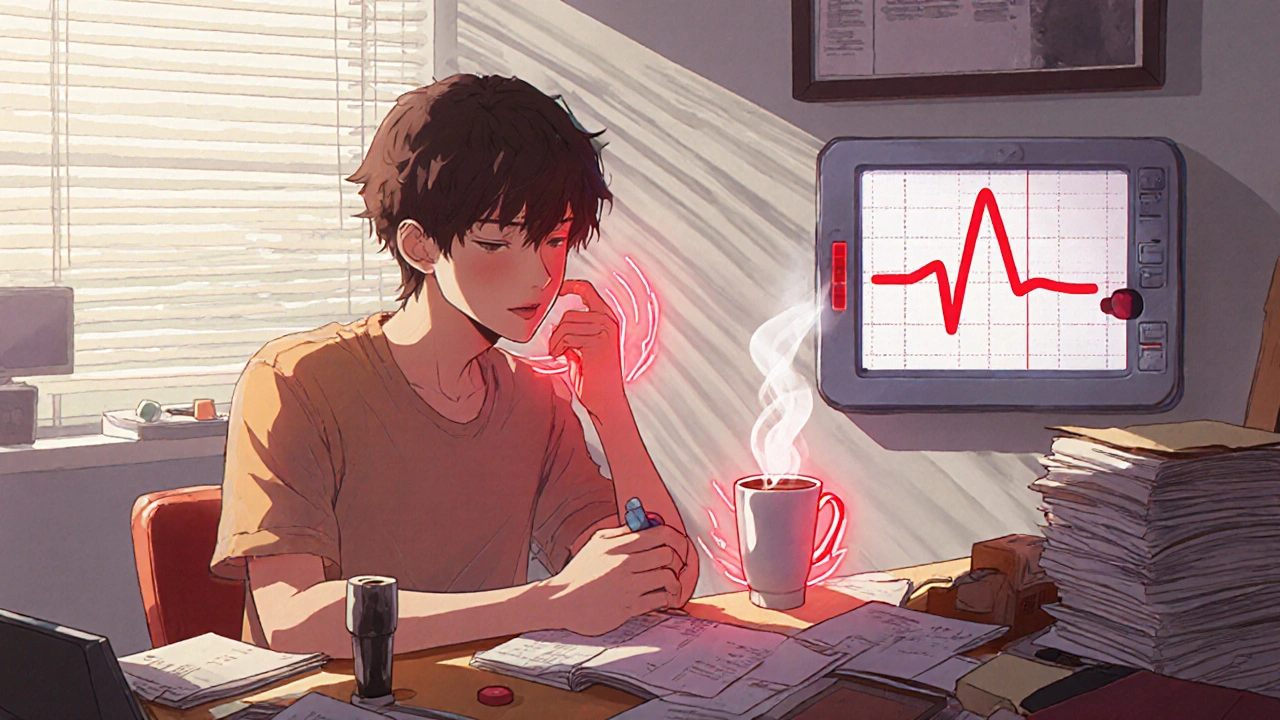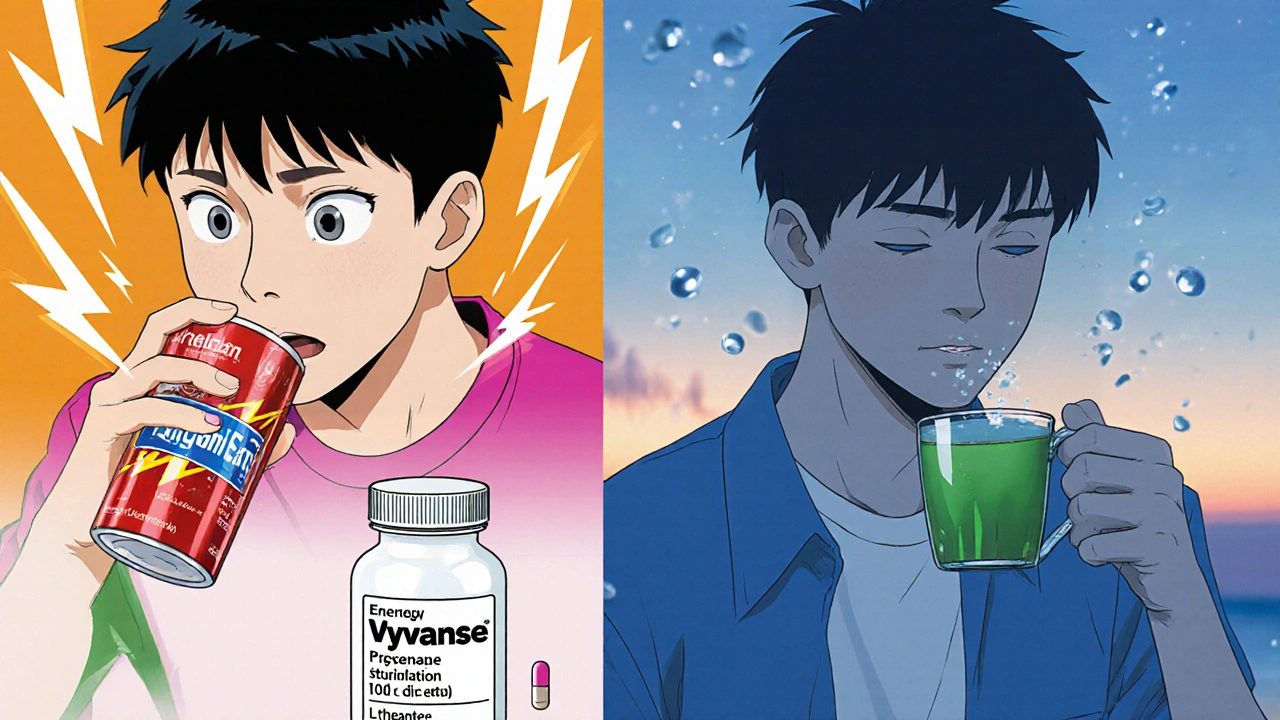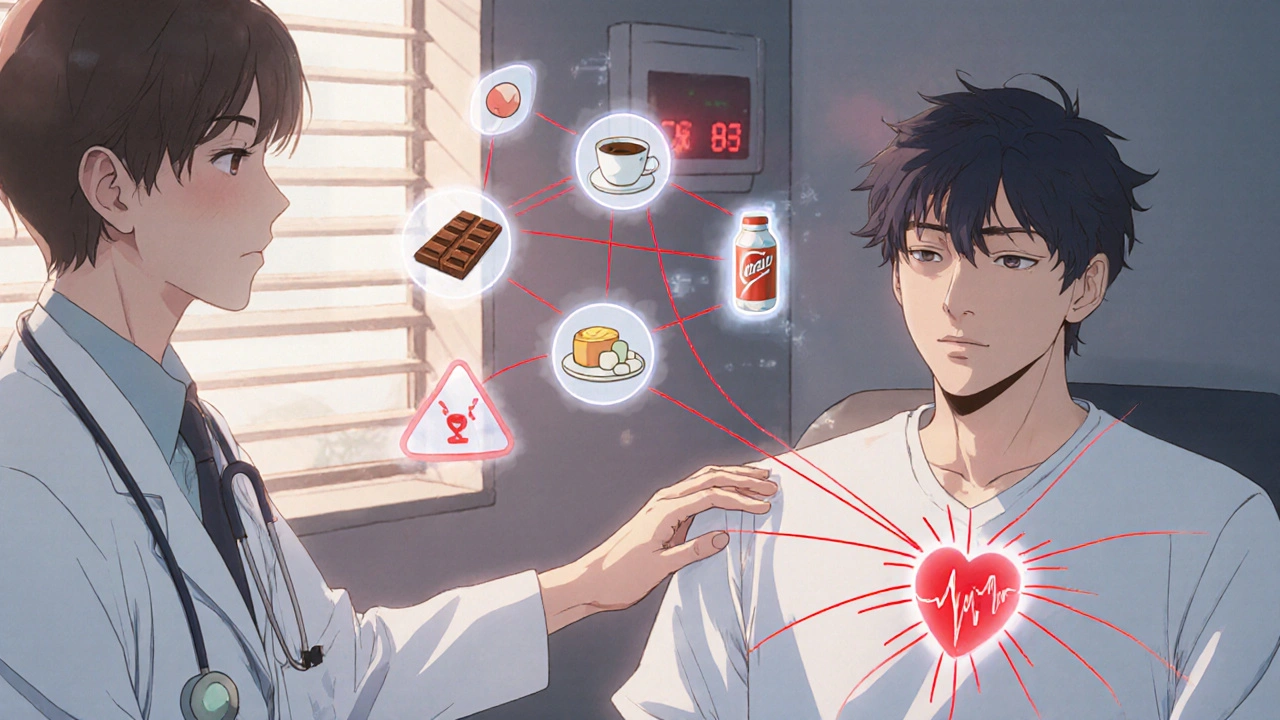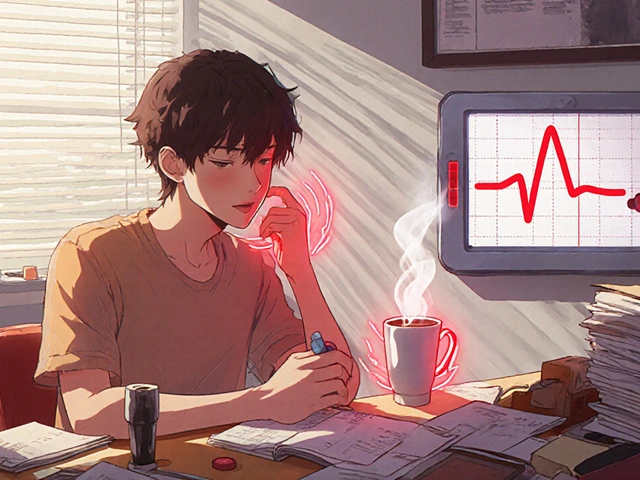
Millions of people with ADHD take stimulant medications like Adderall to stay focused. Many of them also drink coffee-sometimes multiple cups a day. It’s not just habit. A lot of people believe caffeine helps their medication work better. But here’s the truth: mixing caffeine with ADHD meds isn’t harmless. It can boost focus, sure-but it can also push your heart rate into dangerous territory, spike your anxiety, or leave you crashing harder than ever.
Why People Combine Caffeine and ADHD Medication
Caffeine and stimulant medications like Adderall both work on the same brain chemicals. They increase dopamine and norepinephrine, which are often low in people with ADHD. That’s why some users swear by their morning coffee with their 10mg or 20mg dose of Adderall. They feel sharper, more alert, and less foggy. But here’s the catch: caffeine is not a controlled substance. You can buy it in coffee, tea, energy drinks, chocolate, and even some pain relievers. No prescription. No dosage guidelines. That’s where things get risky. While Adderall is dosed precisely based on weight, age, and response, caffeine intake is hit-or-miss. One cup of coffee might have 95mg. A grande latte from a chain? That’s 200mg or more. A single energy shot? 300mg. And none of that is tracked by your doctor.The Science Behind the Interaction
Research shows caffeine alone is about 60-70% less effective than prescription stimulants for managing core ADHD symptoms like inattention and impulsivity. But when you stack it on top of Adderall, the effects aren’t just added-they’re multiplied. A 2020 study found that while caffeine alone made it harder for kids with ADHD to control impulses, combining it with L-theanine (a calming amino acid found in tea) actually improved focus and task performance. That’s important. It suggests caffeine isn’t the problem-it’s the unbalanced combo. Adderall has a half-life of 9-13 hours. Caffeine’s is about 5 hours. That means if you take your medication at 7 a.m. and drink a coffee at noon, both are still active in your system at 3 p.m. By 6 p.m., Adderall is still working. Caffeine? Still half there. That’s a double stimulant load during evening hours, when your body should be winding down.Side Effects: When the Boost Turns Dangerous
The most common side effect? Anxiety. In a Reddit thread with over 1,200 comments from ADHD users, nearly 60% said combining caffeine and Adderall made them feel jittery, panicked, or overwhelmed. One user wrote: “I used to take my Adderall with a large coffee. I’d feel amazing for two hours, then my heart would race so hard I thought I was having a heart attack.” Cardiovascular risks are real. A 2022 study from Johns Hopkins found that combining stimulants like Adderall with caffeine increased the risk of tachycardia (fast heart rate) by 37% and high blood pressure by 29%. These numbers aren’t theoretical. Emergency department visits related to stimulant-caffeine combinations rose 27% between 2019 and 2023. And it’s not just adults. The American Academy of Pediatrics explicitly warns against mixing caffeine with ADHD meds in children and teens. Their developing nervous systems are more sensitive. Their hearts are smaller. Their caffeine metabolism is slower. Even a single energy drink can trigger palpitations or dizziness.
Hidden Sources of Caffeine You’re Probably Ignoring
Most people think of coffee when they think of caffeine. But it’s everywhere.- Dark chocolate: 1 ounce = 12-25mg
- Green tea: 1 cup = 20-45mg
- Energy drinks: 1 can = 80-300mg
- Some headache pills: Up to 130mg per tablet
- Pre-workout supplements: Often 200-400mg per serving
How to Do It Safely (If You Choose to)
I’m not telling you to quit coffee. But if you’re on Adderall or another stimulant, here’s how to reduce the risk:- Start low. Try 100mg of caffeine max-about one small coffee. That’s less than half the amount in a typical grande latte.
- Wait 4-5 hours. Take your medication first. Let it settle. Then have your coffee. This avoids peak overlap.
- Don’t take it on an empty stomach. Food slows caffeine absorption and reduces GI upset, which affects nearly half of users who combine the two.
- Track your heart rate. Wearables like Fitbit or Apple Watch can alert you to spikes. If your resting heart rate jumps above 100 bpm after combining them, cut back.
- Know your limits. The FDA says 400mg of caffeine per day is safe for most adults. But if you’re on stimulants, that ceiling should be lower-closer to 200mg. The American Heart Association recommends no more than 200mg daily if you have any heart condition, and 23% of adults with ADHD do.
The L-Theanine Advantage
If you want to keep caffeine in your routine but reduce the jitters, L-theanine might be your best friend. This natural compound, found in green tea, helps calm the nervous system without making you sleepy. A 2023 NIH-funded study found that a 3:1 ratio of L-theanine to caffeine (like 150mg L-theanine with 50mg caffeine) improved focus and reduced anxiety in ADHD patients more than caffeine alone. It’s available as a supplement, and some people mix it into their morning coffee. It doesn’t cancel out the focus boost-it smooths out the rough edges.
Who Should Avoid This Combo Altogether
Not everyone should experiment. Avoid combining caffeine with ADHD meds if you:- Have a history of heart arrhythmias, high blood pressure, or heart disease
- Are under 18
- Take long-acting stimulants (like Vyvanse) and already feel wired by midday
- Have anxiety disorders
- Are a slow caffeine metabolizer (about 40% of people have a gene variant that makes caffeine stick around longer)
What to Do If You’re Already Feeling the Effects
If you’ve been combining caffeine and Adderall and now feel:- Heart palpitations
- Shaking hands or tremors
- Insomnia that lasts past midnight
- Constant dread or panic
Bottom Line: It’s Not Worth the Risk
Caffeine isn’t evil. Coffee isn’t the enemy. But when you mix it with a powerful prescription stimulant, you’re playing with fire. The benefits are marginal. The risks are real. If you’re using caffeine to make your ADHD meds work better, you’re not being smart-you’re being self-medicated. And that’s dangerous. Talk to your doctor. If your medication isn’t working, there are better solutions: adjusting the dose, switching medications, adding behavioral therapy, or trying non-stimulant options like Strattera. Don’t rely on a cup of coffee to fix what your treatment plan can’t. Your brain doesn’t need more stimulation. It needs balance. And caffeine, when paired with Adderall, rarely delivers that.Can I drink coffee while taking Adderall?
You can, but it’s not safe without caution. Combining caffeine and Adderall can amplify side effects like anxiety, rapid heartbeat, and insomnia. If you choose to do it, limit caffeine to 100mg or less per day, wait 4-5 hours after taking your medication, and avoid energy drinks or pre-workout supplements. Always monitor your heart rate and talk to your doctor.
Does caffeine make ADHD medication more effective?
Caffeine alone is much less effective than prescription stimulants for ADHD symptoms. While some people feel more focused when combining it with Adderall, studies show this is often due to increased stimulation, not better symptom control. In fact, caffeine can worsen impulsivity and make crashes worse. The improvement is temporary and comes with higher risks.
What are the signs I’m consuming too much caffeine with my ADHD meds?
Watch for heart palpitations, trembling, extreme anxiety, trouble sleeping past midnight, dizziness, or nausea. If your resting heart rate regularly goes above 100 bpm, or you feel jittery even after not drinking coffee for hours, you’re likely overdoing it. Stop caffeine for a few days and see if symptoms improve.
Is decaf coffee safe with Adderall?
Decaf coffee still contains 2-15mg of caffeine per cup-enough to affect sensitive individuals. If you’re a slow caffeine metabolizer or have heart issues, even decaf can contribute to side effects. For most people on Adderall, decaf is a safer option than regular coffee, but it’s not completely risk-free. Track how you feel after drinking it.
Can I replace Adderall with caffeine?
No. Caffeine is not a substitute for ADHD medication. It’s far less effective at managing core symptoms like inattention and disorganization. Studies show it’s 60-70% less effective than Adderall. Relying on caffeine alone can lead to worsening symptoms, burnout, and increased risk of anxiety or dependence. Always follow your prescribed treatment plan.
What’s the best time to drink coffee if I take Adderall?
Take your Adderall first, then wait 4-5 hours before drinking coffee. This avoids overlapping peak effects. For example, if you take your medication at 7 a.m., wait until noon or later for coffee. This reduces the chance of a crash or overstimulation later in the day. Avoid caffeine after 2 p.m. to protect your sleep.
Does L-theanine help when combined with caffeine and Adderall?
Yes. L-theanine, found in green tea, helps reduce the jittery side effects of caffeine without dulling focus. A 3:1 ratio of L-theanine to caffeine (like 150mg to 50mg) has been shown in studies to improve attention and reduce anxiety in ADHD patients. It’s a safer way to use caffeine alongside stimulants-but still talk to your doctor before adding supplements.
Are children allowed to drink caffeine with ADHD meds?
No. The American Academy of Pediatrics strongly advises against combining caffeine with ADHD medications in children and teens. Their bodies are still developing, and caffeine can worsen anxiety, disrupt sleep, and increase heart strain. Even small amounts from soda or chocolate can cause problems. Stick to prescribed treatments only.



Been on Adderall for 8 years. Used to chug coffee like it was water. Now I stick to one small cup at noon, never after 2 p.m. My heart stopped feeling like it was trying to escape my chest. Also, L-theanine changed everything. I mix it into my tea now. No jitters, still sharp. Seriously, try it.
Oh wow, so caffeine is bad now? Next you’ll tell me breathing oxygen while on Adderall is a ‘pharmacological overload.’ I’m just here for the drama.
Decaf still has caffeine. Be careful.
OMG I just realized I’ve been drinking 3 energy drinks a day with my Vyvanse 😳 I’m so done. I’m switching to green tea + L-theanine now 🍵✨ #ADHDlife #selfcare
I’m from India, and we drink chai all day. I used to think it helped me focus with my Ritalin. But after my heart started skipping beats, I tracked everything. Turns out, one cup of chai = 40mg caffeine, and I had 3-4 daily. That’s 120-160mg-plus my med. No wonder I felt like a wired squirrel. Now I have one weak chai in the morning, and I feel way better. If you’re on meds, don’t assume ‘traditional’ = safe. Your body doesn’t care about culture-it cares about chemistry.
This is such a thoughtful breakdown. I love how you didn’t just say ‘don’t do it’-you gave practical steps. I’ve been recommending L-theanine to my ADHD support group for months. One guy said he felt like his brain went from ‘shouting in a storm’ to ‘calm conversation in a library.’ That’s the vibe. Also, food matters. Taking Adderall on an empty stomach with espresso? Bad idea. Eat a banana first. Your gut will thank you.
Thank you for writing this. So many people think ‘it’s just coffee’ and don’t realize how dangerous stacking stimulants can be. I had a panic attack last year because I didn’t know my pre-workout had 250mg of caffeine. I was on Adderall, too. I didn’t sleep for three nights. I wish I’d found this post sooner. Please, if you’re reading this and you’re feeling off-stop the caffeine. Give your nervous system a break. You’re not weak for needing to cut back. You’re smart.
Let’s be real. The pharmaceutical industry hates that caffeine is free and legal. They want you buying expensive pills, then paying for ‘L-theanine supplements’ to fix the side effects they created. Meanwhile, Big Coffee and Big Pharma are the same corporate overlords. They profit from your dependence. The real solution? Stop taking stimulants altogether. Go outside. Walk. Breathe. Eat real food. Your ADHD isn’t a chemical imbalance-it’s a modern life problem. But no, let’s keep buying pills and ‘natural’ additives. That’s the American dream, right?
There’s a quiet truth here: we’re not trying to be more productive. We’re trying to feel normal. Caffeine isn’t about energy-it’s about safety. When your brain won’t quiet down, a cup of coffee feels like the only thing holding you together. I get it. But the body remembers. It holds onto every spike, every crash. Maybe the real question isn’t ‘can I have coffee?’ but ‘what am I afraid to feel without it?’